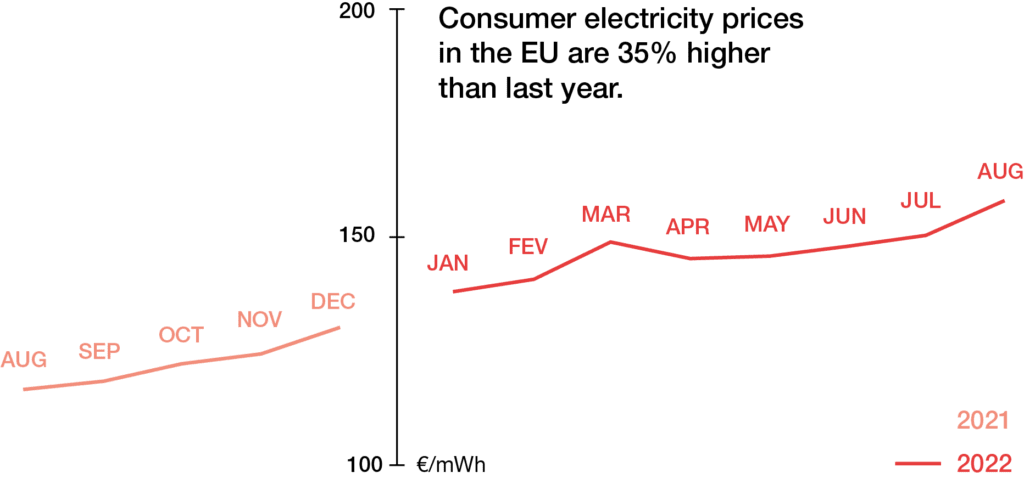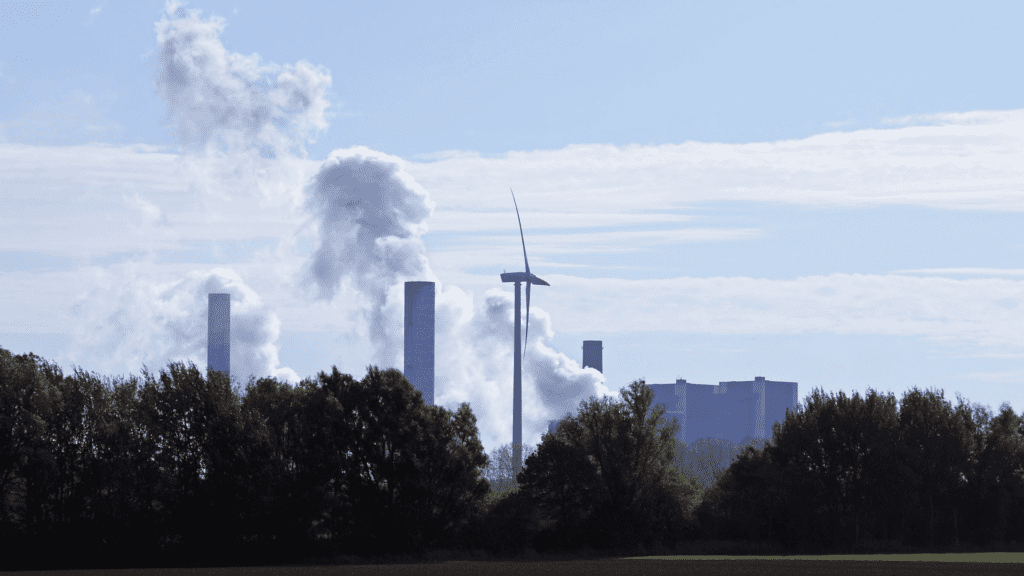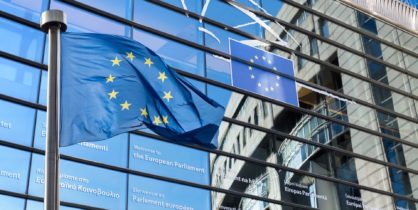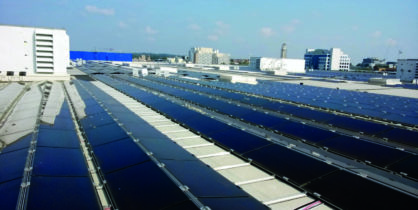Energy Audits for More Sustainable Business
SMEs are at the heart of Europe’s decarbonization plans.
Europe’s energy context
In 2021, the EU’s ‘Fit for 55’ plan legally codified its ambitious goal of reducing emissions by at least 55% by 2030. This goal has since become a necessity, in light of Russia’s invasion of Ukraine in February 2022 placing increased scrutiny on the Continent’s decarbonization plans. The subsequent fluctuation of prices in the energy market has forced the EU to bring forward its plans for both finding alternative sources of energy and reducing energy consumption.
Between February and July of 2022, wholesale gas and electricity prices in Europe skyrocketed by 115% and 237% respectively. Worldwide in 2022, high fuel costs accounted for 90% of electricity price increases, leaving 70 million people in developing countries with recent access to electricity no longer able to afford it.
People in the EU were also hit hard. According to the Council of the European Union, consumer electricity prices in 2022 were 35% higher than in 2021, illustrating an enormous strain on both households and businesses to pay energy bills across the continent.
In 2022, Reuters reported that in Belgium 24% of businesses were at risk of collapse in contrast to past years when the average was closer to 5%. That same year in the UK, approximately 96% of businesses were concerned about energy prices, with 53% of UK small and medium-sized enterprises (SMEs) expected to close or reduce their activities as a result.
This strain on businesses – SMEs in particular – is widespread across Europe. While energy-intensive sectors such as building materials, metal, and refining industries have been singled out as most at-risk by Oxford Economics, small firms in the service and retail industries have reported the highest amounts of debt acquisition due to rising energy costs.
What is an SME?
The EU defines an SME as a business that meets at least two of the following criteria:
- having fewer than 250 employees with an annual turnover of less than €50 million,
- an annual balance sheet total of less than €43 million.
Given these specifications, SMEs account for 99% of all businesses in the EU, employing around 100 million people. The impacts of the energy crisis on these businesses means a ripple effect on individuals, communities and national economies.
As the backbone of the wider EU economy, SMEs need support to recover from the energy crisis of 2022 and to become more resilient should such crises recur in the future.

Continental business impact
Immediately following Russia’s invasion of Ukraine, the EU acted to mitigate the impact of the impending energy crisis with its REPowerEU plan that focused on reducing the EU’s dependence on Russian gas, while also “tackling the climate crisis” through energy savings and an accelerated roll-out of renewables.
There was initial skepticism of the approach, given their inclusion of policies that discouraged growth of companies producing electricity from renewables and the rise in share of petroleum and natural gas imports by 2.2% and 8.1% respectively in the autumn of 2022.
This fueled fears that Europe could see a dramatic shift towards coal and oil to replace Russian gas, especially after European Commission President Ursula von der Leyen met with the CEOs of Shell, BP, Total, Eni, E.ON and Vattenfall in March 2022 to discuss the need to secure the short-term supply of petroleum.
However, these fears did not fully materialize as the share of electricity generation from wind and solar surpassed that of fossil fuels for the first time in the EU.
This shift towards renewables is a welcome one, but the EU cannot meet decarbonization targets just through an increased focus on renewables and greater energy independence. Without increased energy efficiency, there can be no Net Zero.
Energy prices in the EU


Decarbonization with ‘energy efficiency first’
The need for increased energy efficiency in the EU has been officially recognized for over a decade. In 2012, the EU announced its Energy Efficiency Directive (EED) requiring Member States to implement energy efficiency measures. Amended in 2018, it set the goal of a reduction of energy consumption of 32.5% by 2030, but such a decrease in energy use still wouldn’t be enough to stay on target for Net Zero by 2050.
Taking this into account, the EU set a new energy efficiency target of a 42.5% reduction of primary energy use by 2030. Speaking at World Sustainable Energy Days in Wels, Austria, Carlos Sanchez Rivero from DG Energy stated that “Renewables, electrification and energy efficiency are the main pillars of the energy transition.” He went further, reiterating the increase of the EU’s Fit for 55 binding energy efficiency target from 9% to 13%.
But a large part of the EU’s communication on energy efficiency focuses on changes in energy choices, which are “mainly voluntary and rely on goodwill.” This can have some effect on Europe’s overall energy efficiency, with the IEA stating that choices alone could reduce gas consumption by 5%. But the people running small businesses need more guidance to understand exactly how they can be more energy efficient.
An essential part of businesses receiving this guidance is through energy audits. Adrianna Threpsiadi, from the UK’s Energy Saving Trust, emphasized the important role energy audits will play in meeting decarbonization targets.
“Properly supporting SMEs to decarbonize can have a really important contribution to those long-term climate targets, and audits are an important part of the framework that is needed,” Threpsiadi said.
But for these audits to be effective, SMEs must have the resources available to them to understand exactly what an energy audit is, and how they can get access to one.

The Importance of Energy Audits
The energy audit process normally involves several steps, including data collection and analysis and evaluation of different processes conducted by the business such as heating, refrigeration, transportation and other industrial processes. This analysis is then presented to the business with recommended ways to improve their energy efficiency.
Energy audits are pivotal to increasing awareness of energy efficiency as well as suggesting concrete actions to improve it. The role of energy audits is recognized in the EED, with the European Union requiring all large businesses to conduct an energy audit every four years. Small businesses, however, are not required to do so.
According to research done by the LEAP4SME project, the voluntary nature of energy audits is seen as a barrier to increasing energy efficiency by both businesses and by national organizations. The implementation of the findings of energy audits is also not compulsory.
Energy audits are key for businesses to understand where they can save energy and reduce costs, particularly during periods with high energy costs. But it is also important to understand that energy audits can provide numerous non-energy benefits, such as improved air quality and an overall improved working environment with implications for better health and well-being.
Claudia Toro, from the Italian National Energy Agency, explains that businesses are often unaware of the benefits of energy audits.
“SMEs are not conscious of the advantages of energy efficiency, which are not only related to energy. There are a lot of other non-energy benefits which are completely unknown for companies,” Toro says.
Through the Energy Efficiency Directive (EED), the European Union requires all large businesses to conduct an energy audit every four years, however SMEs are not required to do so.
According to a survey conducted by LEAP4SME, companies ranked improving their perceived image right below the direct economic and environmental benefits of increased energy efficiency. Therefore, being able to demonstrate a commitment to sustainability is no longer an option for businesses, but a necessity.
However, that same survey showed that there are still several barriers for businesses wanting to implement energy saving measures. Energy audits can be expensive, and the recommendations they make often require substantial investment to implement, even if the rate of return on those efficiency investments is high.
This is what makes strong, robust, energy audit policies so important. In areas where energy audits are heavily subsidized, and the implementation of audit recommendations are compulsory, there is an acceleration in the transition towards energy efficiency.

“If countries like Italy want to reach the targets of savings and reducing CO2 emissions, SMEs should be involved in this process,” Toro claims. “We need SMEs to move towards energy efficiency, and of course energy audits are the first step for them, because energy audits are the only way for a company to understand how they are consuming their energy, where they are consuming it, and how they can improve their energy efficiency level.”
For Europe to fulfill its energy efficiency potential, energy audits should be as commonplace as a financial audit. They are essential not only for more sustainable, resilient businesses, but more profitable ones as well.
Energy Audit Best Practices
Ireland’s Energy Audit Support Scheme
The Sustainable Energy Authority of Ireland (SEAI)’s support scheme for energy audits offers SMEs a €2,000 voucher towards the cost of an energy audit. In most cases, this covers the total cost of the audit.
Austria’s klimaaktiv Building and Renovating Scheme
This scheme is working towards energy-efficient building and utilizing renewable sources of energy to cut greenhouse gasses. More than 1200 buildings have been built or renovated with new energy efficiency stands since the program started in 2005.
Italy’s Energy Intensive Industry Program
All energy intensive companies – regardless of size – must carry out energy audits. Of the energy efficiency measures suggested in the audit, the company must implement at least one. As of July 2020, over 2,500 SMEs had carried out energy audits.





